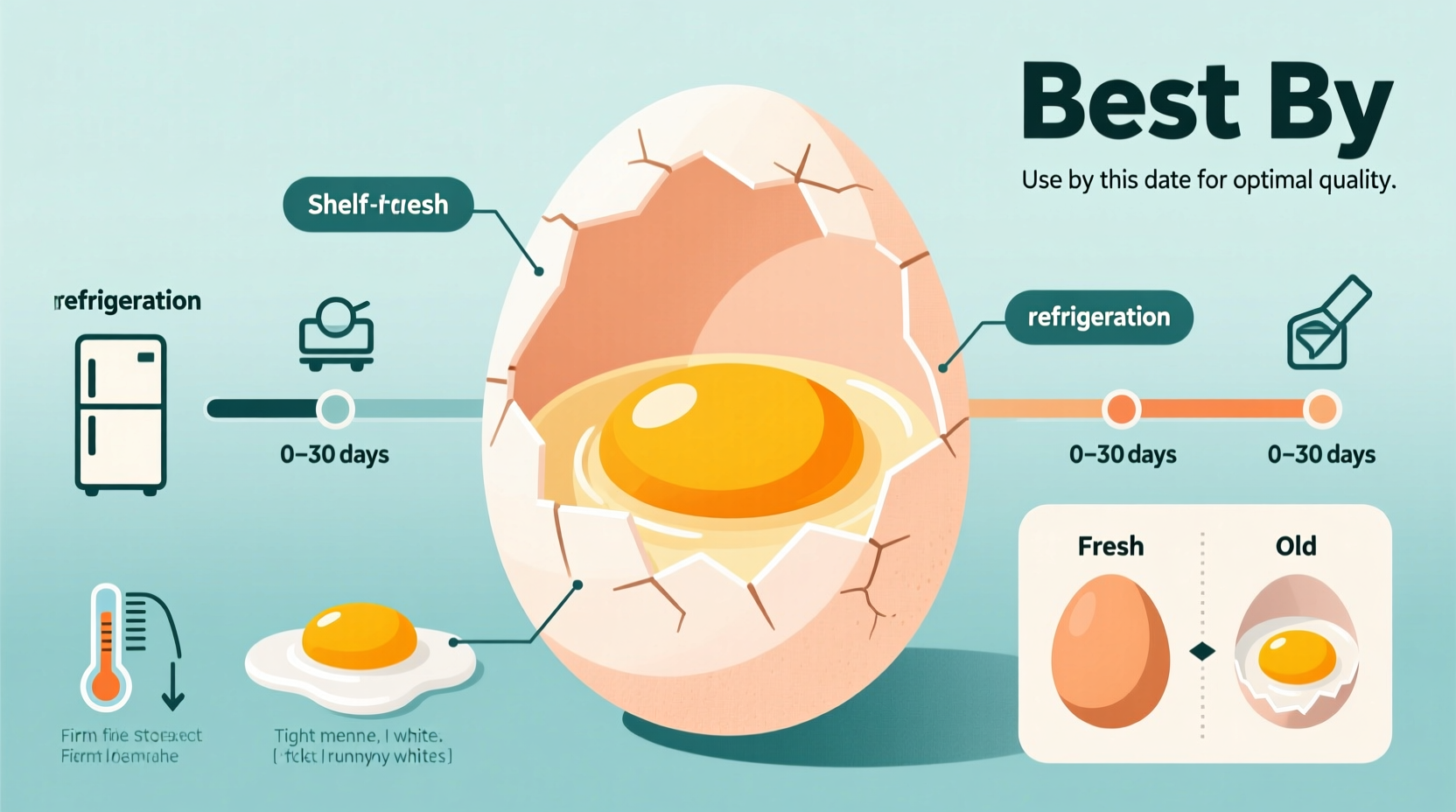Eggs are a staple in kitchens around the world—versatile, nutritious, and essential for countless recipes. Yet, confusion over labeling, freshness, and safe storage often leads to unnecessary waste or, worse, foodborne illness. Understanding what \"best by\" dates actually mean—and how to properly store eggs—can make a significant difference in both safety and quality. This guide breaks down the facts, dispels myths, and provides actionable steps to ensure your eggs stay fresh as long as possible.
What Does the “Best By” Date on Eggs Really Mean?

The date stamped on an egg carton is not a strict expiration date but rather a guideline indicating peak quality. In the United States, the USDA allows producers to label eggs with terms like “Best By,” “Sell By,” or “Use By.” These refer to freshness, not safety. According to the U.S. Food and Drug Administration (FDA), eggs can remain safe to eat for 3 to 5 weeks after purchase if stored properly—even beyond the printed date.
The “best by” date is typically set at 30 days from the day the eggs were packed. Since most commercial eggs reach stores within days of being laid, this means they’re likely still fresh well past that mark. However, this assumes consistent refrigeration. Temperature fluctuations accelerate spoilage, so understanding proper handling is just as important as reading the label.
How Long Do Eggs Actually Last?
Freshness declines gradually, but spoilage doesn't happen overnight. When kept refrigerated at or below 40°F (4°C), raw eggs in their shells can last 3 to 5 weeks from the day they’re purchased. The key factor isn't the calendar—it’s storage conditions.
Over time, the egg’s internal quality changes: the yolk may flatten, and the white becomes thinner due to moisture loss through the porous shell. While these changes don’t pose a health risk, they affect performance in baking and texture when cooked.
Once cracked or cooked, eggs have a much shorter shelf life. Beaten raw eggs last 2–4 days in the fridge; hard-boiled eggs last up to one week. Frozen whole eggs (lightly beaten) can be stored for up to a year, though texture degrades slightly upon thawing.
Egg Shelf Life Summary
| Type of Egg | Refrigerator Storage | Freezer Storage |
|---|---|---|
| Raw in Shell | 3–5 weeks | Not recommended |
| Beaten Raw Eggs | 2–4 days | Up to 1 year |
| Hard-Boiled Eggs | 1 week | Peeled or unpeeled — not recommended |
| Egg Whites Only | 4 days | Up to 1 year |
| Egg Yolks Only | 2 days | Up to 1 year (with salt/sugar) |
Proper Storage Techniques to Maximize Freshness
Where you store your eggs matters more than many realize. Despite common practice, the refrigerator door is the worst place for eggs. Its temperature fluctuates every time the door opens, accelerating degradation. Instead, store eggs in their original carton on an interior shelf, where temperatures are most stable.
The carton serves multiple purposes: it protects against physical damage, prevents odor absorption (eggshells are porous), and helps retain moisture. Storing eggs pointy-end down keeps the air cell—a small pocket between the inner membranes—centered at the top, reducing movement of the yolk and minimizing contact with the shell.
“Eggs should never be stored in the door. Consistent cold temperatures preserve quality and reduce bacterial growth.” — Dr. Linda Harris, Food Microbiologist, UC Davis
Step-by-Step Guide to Storing Eggs Safely
- Keep eggs in their original carton to maintain humidity and block odors.
- Place the carton on a middle or lower shelf in the refrigerator, not the door.
- Maintain a consistent temperature at or below 40°F (4°C).
- Avoid washing eggs before storage unless absolutely necessary—this removes the natural protective coating.
- Label home-packed eggs with the date collected or purchased for tracking.
Testing Egg Freshness at Home
If you're unsure whether an older egg is still good, simple tests can help determine its condition without cracking it open.
The most reliable method is the water test: fill a bowl with cold water and gently place the egg inside. A fresh egg will lie flat on the bottom. One that stands upright but remains on the bottom is less fresh but still edible. If it floats to the surface, it has accumulated too much air and should be discarded.
This works because eggs lose moisture over time, increasing the size of the internal air cell. While floating doesn’t automatically mean the egg is spoiled, it indicates reduced freshness and potential bacterial infiltration through the shell pores.
Another test involves cracking the egg onto a plate. Look for signs such as:
- A firm, rounded yolk that holds its shape
- Thick, gel-like egg whites close to the yolk
- No off-putting odor—especially sulfur or rot
If any of these qualities seem off, err on the side of caution and discard the egg.
Common Misconceptions About Egg Labels
Understanding the terminology on egg cartons reduces confusion and supports informed decisions. Here’s a breakdown of commonly misunderstood labels:
| Label Term | Meaning | Regulated? |
|---|---|---|
| Best By / Sell By | Peak quality date; not a safety cutoff | Yes (USDA) |
| Organic | Hens fed organic feed, no antibiotics or synthetic pesticides | Yes (USDA Certified Organic) |
| Cage-Free | Hens not confined to cages (but may be indoors) | Limited oversight |
| Free-Range | Access to outdoor space (duration/quality varies) | Minimal standards |
| Pasture-Raised | Hens spend significant time outdoors on pasture | No federal standard; verify brand claims |
| Natural | No added artificial ingredients—applies to all eggs | Not meaningful for eggs |
Real-Life Example: The Forgotten Weekend Frittata
Sarah had leftover eggs from a farmer’s market visit two weeks prior. With plans to make a frittata, she pulled the carton from her fridge—but couldn’t find the date. She remembered storing them on the top shelf, away from strong-smelling foods like onions. To be safe, she performed the water test. All eggs sank and lay flat. She cracked one into a bowl: the yolk was high and intact, the white thick and clear. Confident in their freshness, she proceeded. The frittata turned out perfectly, proving that proper storage trumps arbitrary dates.
Frequently Asked Questions
Can I eat eggs after the “best by” date?
Yes, if refrigerated continuously, eggs are generally safe to eat for 3 to 5 weeks after purchase—even if past the labeled date. Always perform a visual and smell check before use.
Why shouldn’t I wash my eggs before storing them?
Commercially washed eggs in the U.S. are sanitized and coated with a thin layer of oil to protect the shell. Washing at home removes this barrier and increases the risk of bacteria entering through pores. Only wash eggs right before using them.
Are brown eggs fresher than white ones?
No. Shell color depends on the breed of hen and has no bearing on freshness, nutrition, or taste. Both types have identical shelf lives when stored correctly.
Final Checklist: Keep Your Eggs Fresh and Safe
- ✔️ Store eggs in the main body of the refrigerator, not the door
- ✔️ Keep them in the original carton to prevent odor transfer
- ✔️ Maintain a fridge temperature at or below 40°F (4°C)
- ✔️ Use the water test to check freshness of older eggs
- ✔️ Discard any egg with a foul odor, slimy texture, or discoloration
- ✔️ Label homemade or farm-fresh eggs with collection dates
Conclusion: Make Smarter Choices Starting Today
Understanding the best by date on eggs and how to keep them fresh empowers you to reduce waste, save money, and cook with confidence. It's not about rigid deadlines—it's about smart habits. From proper storage to simple freshness tests, small actions lead to big improvements in food safety and quality. Take control of your kitchen today by applying these science-backed practices. Your next omelet, cake, or custard will thank you.









 浙公网安备
33010002000092号
浙公网安备
33010002000092号 浙B2-20120091-4
浙B2-20120091-4
Comments
No comments yet. Why don't you start the discussion?